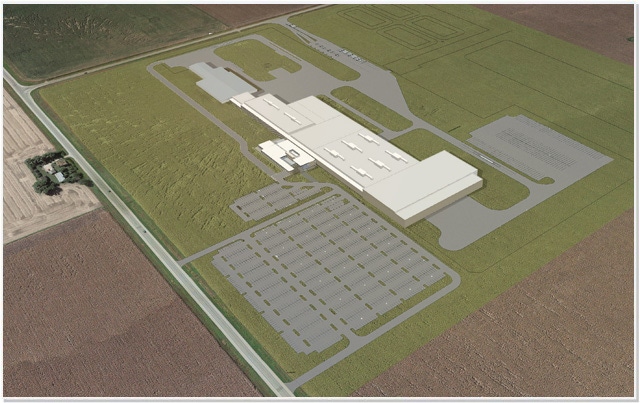Prestage Iowa packing plant will stand out for its latest technology, attention to details and create a competitive marketing opportunity for America’s pig farmers.
February 7, 2017

U.S. shackle space is tight, and no one knows that better than America’s pig farmers. The weekly pork packing capacity stands at 2.453 million head. For six weeks in fall 2016, the number of pigs processed surpassed that weekly total.
Pork production is not anticipated to slow down anytime soon. Steve Meyer, vice president of pork analysis at Express Markets Inc., estimates U.S. pork production will grow 3.9% this year. So, it is a good thing that help is on the way in the form of new plants.
“The new packing plants are a big source of optimism for the pork industry and the entire country,” says Ron Prestage, DVM and president of Prestage Farms.
While the nation will add five new plants by 2018, the biggest capacity gains will come in the latter half of 2017 and 2018. The Triumph-Seaboard Foods and Clemens Food Group plants in Sioux City, Iowa, and Coldwater, Mich., respectively, are on schedule to open this July.
Yet, the most talked about new pork packing plant coming on board in 2018 is Prestage Foods of Iowa LLC. Weather permitting, Prestage says “We are hoping to start construction by the end of March.”
It will take the company 18 to 20 months to complete the construction phase on this modern, cutting-edge pork processing facility. The unique view as a hog producer and veterinarian puts a different spin on processing pigs and marketing pork. Prestage shares with the Illinois Pork Expo that his family’s packing plant will stand out for its latest technology, attention to details and create a competitive marketing opportunity for America’s pig farmers.
Food safety: Providing a safe pork product for the consumer’s plate worldwide is the first priority for this licensed veterinarian. A modern plant equipped with the latest technology and well-trained employees will ensure food safety remains at the forefront.
Traceability: Consumers’ demand is ever-changing, Prestage notes. Yet, if a pork processing plant cannot trace the pork back to the actual producer and production practices, then it is impossible to confidently deliver the product the consumer is demanding. “This plant is being designed with the intent of being able to process with unheard level of traceability of product,” Prestage states.
At this point, Prestage cannot confirm the market for all the pork processed at the plant – that is still a work in progress in the preliminary stages. However, the global markets are essential to the success of this new packing facility by getting the full value of the pig. Many cuts of meat U.S. consumers will not purchase, however consumers across the globe will. Therefore, the traceability capability adds a new dimension for the global marketplace.
Pig health: An estimated one million pigs are transported daily from one location to another in the United States. Research shows that two primary sources – people and trucks – contribute to the spread of diseases back to the farm from processing plants. After the porcine epidemic diarrhea virus outbreak, the standard practice has become for truck drivers not to step foot in the plant. Trucks, on the other hand, have to be handled differently. Prestage explains the solutions are simple – define the truck flow and have on-premises truck wash. “The goal is to have a very sensible traffic flow. You don’t want trucks leaving with clean products going to distribution centers or other customers crossing that line where live hogs are coming in on semi-trailers,” he notes.
Furthermore, every trailer hauling pigs from the Prestage Farms will be washed on-site. This service will be offered to every producer bringing pigs to the plant. It will not be required for every truck leaving the facility to use the truck wash. However, if this step is skipped, then the truck must leave in the dirty lane, exposing it to pathogens twice. “If PEDV did not teach us anything, it is in this country we need to pay attention to biosecurity. We all know how to do this on the farm. Maybe we have not done as good a job as we needed to do at looking at the plant as a source as potentially in disseminating certain diseases,” states Prestage.
Once the Prestage Iowa plant is open for business, it will process 50,000 pigs a week. At first, Prestage Farms will supply 30,000 of the pigs to the plant, and the remainder will be purchased from independent producers. If the plant goes to a second shift, then all those pigs will also be purchased from independent producers in the Upper Midwest. “I think most people will recognize that things we are trying to build in this plant are going to be good business for pork producers due to the increase in biosecurity, attention to details, traceability and food safety,” Prestage concludes.
You May Also Like



